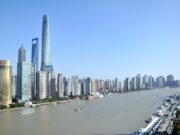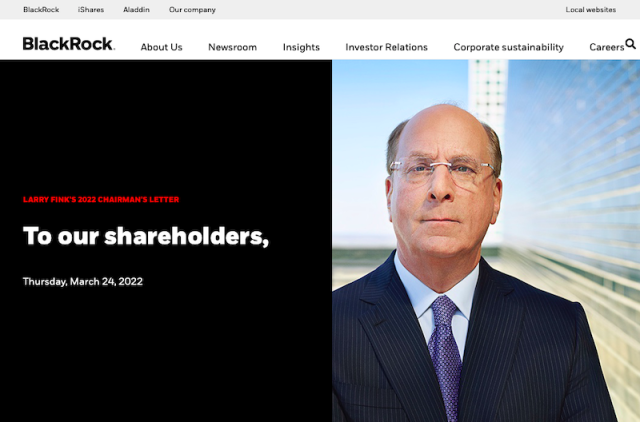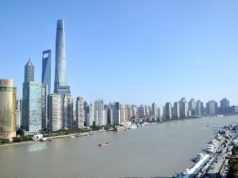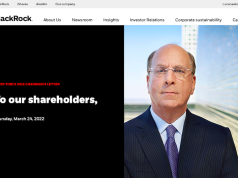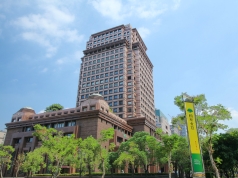$10 Trillion World Largest Asset Manager BlackRock Larry Fink 2022 Chairman Letter
26th March 2022 | Hong Kong
BlackRock Chairman Larry Fink has released his 2022 Chairman Letter, providing key insights into the Russia & Ukraine war, end of globalisation after 30 years, Russian energy dependency re-orientation, central bank policy on inflation, acceleration of green energy and digital currencies and payment system. BlackRock is the world’s largest asset manager with more than $10 trillion of Assets under Management (AUM). Key Highlights:
- In consultation with stakeholders, BlackRock has also joined the global effort to isolate Russia from financial markets.
- Russian invasion of Ukraine has put an end to the globalization we have experienced over the last 3 decades.
- On Russia Energy: companies and governments will also be looking more broadly at their dependencies on other nations.
- a large-scale reorientation of supply chains will inherently be inflationary.
- Central banks must choose whether to live with higher inflation or slow economic activity and employment to lower inflation quickly.
- Recent events will actually accelerate the shift toward greener sources of energy in many parts of the world.
- A less discussed aspect of the war is its potential impact on accelerating digital currencies.
- A global digital payment system, thoughtfully designed, can enhance the settlement of international transactions while reducing the risk of money laundering and corruption.
- Digital currencies can also help bring down costs of cross-border payments, for example when expatriate workers send earnings back to their families.
- View full letter below
“ End to the globalization we have experienced over the last 3 decades “
BlackRock Larry Fink 2022 Chairman Letter

To our shareholders,
Thursday, March 24, 2022
As I write this letter to you, the world is undergoing a transformation: Russia’s brutal attack on Ukraine has upended the world order that had been in place since the end of the Cold War, more than 30 years ago. The attack on a sovereign nation is something we have not seen in Europe in nearly 80 years – and most of us never imagined that in our lifetimes we would see a war like this waged by a nuclear superpower.
I speak for everyone at BlackRock when I say that witnessing Russia’s invasion of Ukraine has been truly heartbreaking. We stand with the Ukrainian people, who have shown true heroism in the face of merciless aggression.
War is always a humanitarian tragedy, but the indiscriminate killing of civilians has been particularly painful to witness. I am proud of BlackRock’s support for refugees fleeing their homes. In consultation with our stakeholders, BlackRock has also joined the global effort to isolate Russia from financial markets. In the past few weeks, BlackRock mobilized a philanthropic response to help those in need and support our colleagues in Europe, closest to the war. While we do not have offices or operations in Russia or Ukraine, I know that this has created a great deal of stress and uncertainty for all of our employees, particularly those in Europe, and we have worked to provide them with the resources they need.
The ramifications of this war are not limited to Eastern Europe. They are layered on top of a pandemic that has already had profound effects on political, economic, and social trends. The impact will reverberate for decades to come in ways we can’t yet predict.
In the early 1990s, as the world emerged from the Cold War, Russia was welcomed into the global financial system and given access to global capital markets. In time, Russia became interconnected with the world and deeply linked to Western Europe. The world benefited from a global peace dividend and the expansion of globalization. These were powerful trends that accelerated international trade, expanded global capital markets, increased economic growth, and helped to dramatically reduce poverty in nations around the world.
It was during this time that we started, 34 years ago, to build BlackRock. We saw the rise of globalization and growth of the capital markets fueling a need for the kind of technology-driven asset management that we believed we could bring to our clients. We believed the world would come closer together. And we saw that happen. I remain a long-term believer in the benefits of globalization and the power of global capital markets. Access to global capital enables companies to fund growth, countries to increase economic development, and more people to experience financial well-being.
But the Russian invasion of Ukraine has put an end to the globalization we have experienced over the last three decades. We had already seen connectivity between nations, companies and even people strained by two years of the pandemic. It has left many communities and people feeling isolated and looking inward. I believe this has exacerbated the polarization and extremist behavior we are seeing across society today.
The invasion has catalyzed nations and governments to come together to sever financial and business ties with Russia. United in their steadfast commitment to support the Ukrainian people, they launched an “economic war” against Russia. Governments across the world almost unanimously imposed sanctions, including taking the unprecedented step of barring the Russian central bank from deploying its hard currency reserves.
Capital markets, financial institutions and companies have gone even further beyond government-imposed sanctions. As I wrote in my letter to CEOs earlier this year, access to capital markets is a privilege, not a right. And following Russia’s invasion, we saw how the private sector quickly terminated longstanding business and investment relationships.
BlackRock has been committed to doing our part. Grounded in our fiduciary duty, we moved quickly to suspend the purchase of any Russian securities in our active or index portfolios. Over the past few weeks, I’ve spoken to countless stakeholders, including our clients and employees, who are all looking to understand what could be done to prevent capital from being deployed to Russia.
The speed and magnitude of company actions to amplify sanctions has been incredible. Iconic American consumer brands have suspended their operations of non-essential products. And financial services companies have taken similar steps to further isolate the Russian economy from the global financial system.
These actions taken by the private sector demonstrate the power of the capital markets: how the markets can provide capital to those who constructively work within the system and how quickly they can deny it to those who operate outside of it. Russia has been essentially cut off from global capital markets, demonstrating the commitment of major companies to operate consistent with core values. This “economic war” shows what we can achieve when companies, supported by their stakeholders, come together in the face of violence and aggression.
BlackRock never had significant investments in Russia for the vast majority of our portfolios. For clients who wanted exposure to an index where Russia is a component, such as an emerging markets index, or an active strategy where Russia plays a critical role, such as natural resources, BlackRock invested on their behalf. But our lack of operations in Russia or major exposure has allowed us to pivot quickly in this new environment and move forward with little direct impact to the firm.
It’s impossible to predict precisely what path this war will take. BlackRock is focused on monitoring the direct and indirect impacts of the crisis and working with our clients to understand how to navigate this new investment environment.
Implications of the Russian invasion of Ukraine for companies, countries, and our clients
“The money we manage belongs to our clients. And to serve them, we work to understand how changes around the world will impact their investment outcomes.”
The money we manage belongs to our clients. And to serve them, we work to understand how changes around the world will impact their investment outcomes. BlackRock is able to deliver for our clients during these volatile periods because of the emphasis we place on resilience. We have built both an investment platform and a business strategy that are resilient in the face of uncertainty. And resilience is about much more than withstanding a sudden shock to markets – it also means understanding and addressing long-term structural changes, including what deglobalization, inflation and the energy transition mean for companies, valuations, and our clients’ portfolios.
Russia’s aggression in Ukraine and its subsequent decoupling from the global economy is going to prompt companies and governments worldwide to re-evaluate their dependencies and re-analyze their manufacturing and assembly footprints – something that Covid had already spurred many to start doing.
And while dependence on Russian energy is in the spotlight, companies and governments will also be looking more broadly at their dependencies on other nations. This may lead companies to onshore or nearshore more of their operations, resulting in a faster pull back from some countries. Others – like Mexico, Brazil, the United States, or manufacturing hubs in Southeast Asia – could stand to benefit. This decoupling will inevitably create challenges for companies, including higher costs and margin pressures. While companies’ and consumers’ balance sheets are strong today, giving them more of a cushion to weather these difficulties, a large-scale reorientation of supply chains will inherently be inflationary.
Even before the war’s outbreak, the economic effects of the pandemic – including the shift in consumer demand from services to household goods, labor shortages, and supply chain bottlenecks – brought inflation in the US to its highest level in forty years. Across the European Union, Canada, and the UK, inflation is above 5%. Wages have not kept pace, and consumers are feeling the burden as they are confronted by lower real wages, rising energy bills and higher costs at the grocery store checkout. This is especially true for lower-wage workers who spend a higher proportion of their wages on essentials like gas, electricity, and food.
Central banks are weighing difficult decisions about how fast to raise rates. They face a dilemma they haven’t faced in decades, which has been worsened by geopolitical conflict and the resulting energy shocks. Central banks must choose whether to live with higher inflation or slow economic activity and employment to lower inflation quickly.
Finally, a less discussed aspect of the war is its potential impact on accelerating digital currencies. The war will prompt countries to re-evaluate their currency dependencies. Even before the war, several governments were looking to play a more active role in digital currencies and define the regulatory frameworks under which they operate. The US central bank, for example, recently launched a study to examine the potential implications of a US digital dollar. A global digital payment system, thoughtfully designed, can enhance the settlement of international transactions while reducing the risk of money laundering and corruption. Digital currencies can also help bring down costs of cross-border payments, for example when expatriate workers send earnings back to their families. As we see increasing interest from our clients, BlackRock is studying digital currencies, stablecoins and the underlying technologies to understand how they can help us serve our clients.
The effects on the energy market today and what this means for the net zero transition
As companies recalibrate their global supply chains, and as Western allies reduce their dependence on Russian commodities, the energy sector will be meaningfully impacted. Consumers are facing higher energy costs as we saw the price of oil cross $100 a barrel earlier this year for the first time since 2014. As a result, energy security has joined the energy transition as a top global priority.
As I wrote in my letter to CEOs over the past three years, the energy transition can only work if it is fair and just. Importantly, it will not occur overnight or in a straight line. It requires us to shift the energy mix from brown to light brown to light green to green.
In response to the energy shock caused by the war in Ukraine, many countries are looking for new sources of energy. In the US much of the focus is on increasing oil and gas supply, and in Europe and Asia, coal consumption may increase over the next year. This will inevitably slow the world’s progress toward net zero in the near term.
Longer-term, I believe that recent events will actually accelerate the shift toward greener sources of energy in many parts of the world. During the pandemic, we saw how a crisis can act as a catalyst for innovation. Businesses, governments, and scientists came together to develop and deploy vaccines at scale in record time.
We’ve already seen European policy makers promoting investment in renewables as an important component of energy security. Germany, for example, plans to accelerate its use of renewable energy and reach 100% clean power by 2035, 15 years ahead of its previous pre-war target. More than ever, countries that don’t have their own energy sources will need to fund and develop them – which for many will mean investing in wind and solar power.
Higher energy prices will also meaningfully reduce the green premium for clean technologies and enable renewables, EVs and other clean technologies to be much more competitive economically. However, energy prices at this level are also imposing a terrible burden on those people who can least afford it. We will not have a fair and just energy transition if they remain at these levels.
To date, government planning has only focused on supply without addressing demand. We need public policy to take a more holistic and long-term approach to the world’s energy needs. Among other challenges, as demand for renewable sources of energy and use of clean technology increases, we must consider what this means for the underlying commodities on which these green sources of energy and technology depend. We will also need to accelerate infrastructure investments to support greater use of clean energy and technology. For example, as consumer demand for electric vehicles accelerates, the public and private sector will need to work together to build more charging stations to meet demand.
BlackRock remains committed to helping clients navigate the energy transition. This includes continuing to work with hydrocarbon companies who play an essential role in the economy today and will in any successful transition. To ensure the continuity of affordable energy prices during the transition, fossil fuels like natural gas will be important as a transition fuel. BlackRock’s investments – including one late last year – on behalf of our clients in natural gas pipelines in the Middle East are a great example of helping countries go from dark brown to lighter brown as these Gulf nations use less oil for power production and substitute it with a cleaner base fuel like natural gas.
In the transition to net zero we will need to pass through many shades of brown to shades of green. I remain optimistic for the future and continue to believe that our collective actions today can make a meaningful difference in the years to come.
Taking a long-term view in investing in our own business
Turning to BlackRock’s own performance over the past year, it’s important to put it into the context of our overall history. It’s easy to forget that BlackRock is still a relatively young company.
“And every day since our founding, we’ve listened to our clients. We’ve tried to anticipate the impact of long-term trends and macro development on their portfolios. And we constantly evolved to stay ahead of their needs.”
When my partners and I founded BlackRock 34 years ago, we believed in a new approach to asset management: one that was grounded in robust risk management and guided by client needs. And every day since our founding, we’ve listened to our clients. We’ve tried to anticipate the impact of long-term trends and macro developments on their portfolios. And we constantly evolved to stay ahead of their needs.
In our effort to better serve our clients, we have continuously remade BlackRock, and in doing so, disrupted the industry. We did it by building and enhancing Aladdin as the foundation of our investment process. We did it by combining active and index onto one platform at a time when many believed a firm had to choose one or the other– even though our clients wanted both. We did it by bringing together public and private markets capabilities and providing our clients a comprehensive, whole-portfolio approach.
BlackRock’s clients are long-term investors – representing pensions, insurers, governments and ultimately individual savers – and we take a long-term approach to investing in our own business. As more clients turn to BlackRock, and as we have grown over time, we have been able to make strategic investments, innovate and enhance the value we offer them. We remain as committed to our purpose and principles as we were in 1988. That is why we are focused on providing more choice across our platform, enabling access to the growth of capital markets to more people, and continuing to use our platform to benefit all of our stakeholders.
Providing more choice across our platform
There were plenty of people who had doubts about what ended up being our transformational acquisitions of Merrill Lynch Investment Managers and Barclays Global Investors in the 2000s. These transactions enabled us to reach more clients around the world and to build whole portfolio solutions for our clients by offering diversification across asset classes, including equities, fixed income, alternatives and cash, as well as active and index under one roof. And all of these asset classes and strategies were also brought together on one technology platform, Aladdin.
Today, we continue to be incredibly focused on serving our clients not simply by selling one investment strategy or another but by looking at the entire portfolio and helping them identify strategies that fit their unique preferences and goals. This includes giving clients more choice for how they want to partner with BlackRock – from using one of our ETFs to outsourcing their entire investment portfolio to us. We are able to provide this level of choice to clients because we invested in our platform over time and rallied around a One BlackRock culture that discourages turf wars and rewards collaboration across teams so that we all stay focused on what’s best for the client.
That commitment extends to how we think about evolving for the future, including our work to expand client options for how they participate in proxy voting decisions. Much like asset allocation and portfolio construction, where some clients take an active role while others outsource these decisions to us, different clients are interested in different levels of involvement when it comes to casting proxy votes. After talking with our clients, we used new technology and other innovations to offer proxy voting choice. This is now available to institutional clients representing just over $2 trillion of index equity assets1, including public pension funds serving over 60 million people2. We see this as just a first step. Our ambition over time is to continue developing new technologies and working with industry partners to expand voting choice for even more clients.
The majority of our clients are investing to fund retirement. The people they serve are teachers, nurses, firefighters and factory workers who are saving for their futures. As people live longer and healthier lives, their risk of outliving their savings is accelerating the “silent crisis” of financial insecurity in retirement. That is why BlackRock is working alongside our clients and partners to address income in retirement. In the United States, we shared in 2021 that our retirement income solution, LifePath Paycheck, was being embraced by plan sponsors. Today, six large plan sponsors whose plans together represent over $10 billion in target date investments and more than 150,000 participants, have elected to work with BlackRock to implement our LifePath Paycheck solution as the default investment option in their US employees’ retirement plans, subject to necessary approvals and conditions. We remain committed to helping more people experience financial well-being in retirement.
Enabling access to the growth of capital markets for more people
“Choice” is an incredibly important aspect of our work with clients. But for many people around the world, the fundamental need is simply “access.” They simply don’t have the access to the capital markets that they need to begin shifting from saving to investing. I have long been an advocate for the power of investing over the long term. For example, 40 years ago, a 25-year-old who saved $10,000 in bank deposits would have approximately $50,000 today as he or she reaches retirement. In contrast, that same $10,000 would be worth over $800,000 today if it had been invested in a broad-equity index such as the S&P 500. That is the power of long-term investing. More people around the world need access to that opportunity, and providing them that opportunity aligns with BlackRock’s purpose.
We are using our global reach and expertise to improve access to long-term investing in more places than ever before. In Europe and Latin America, for example, where investors had traditionally only used bank deposits, BlackRock is helping to build a new culture of personal investing. In Germany, nearly 2 million people – triple the number two years ago – are using iShares ETFs to invest through ETF savings plans. And in Brazil, locally listed versions of US iShares are now accessible on third-party direct platforms for minimums as low as $10. This has allowed Brazilians looking for a more convenient and affordable way to invest in global markets to invest $1 billion through iShares in less than a year. And as commission barriers have come down around the world, hundreds of millions of people now have access to ETFs commission-free and are choosing to invest with BlackRock to access capital markets.
Providing high quality at good value: continuing to use our platform to benefit all of our stakeholders
As more clients turn to BlackRock and we have grown to as a global asset manager, we see significant opportunity to continue to use our market reach and scale to drive better outcomes for our clients and results for our shareholders.
Our global market reach and scale benefits investors – especially retail investors – by making it easier to access markets with greater liquidity and lower costs. Through our iShares ETFs, for example, we offer more than 1,200 funds globally – the most of any ETF provider – so our clients can access a diverse range of asset classes and exposures. It has allowed millions of new investors to access high-quality investment strategies at good value. More than 120 million people have invested an average of $50,000 each in our ETF and index capabilities, and we have used the benefits of scale to help our clients save more than $500 million globally through fee reductions in our ETFs over the past five years.
Our platform also enables us to invest in superior market quality, including liquidity, price discovery and efficiency, through proprietary data and analytics. And it allows us to diversify our service providers and implement more efficient trading strategies through multiple intermediaries and better technology.
Scale affords us other competitive advantages too. It allows us to create new jobs, both directly at BlackRock and indirectly through our partners and vendors, and benefit our shareholders as well. Over the past 5 years, we have generated an average 6% organic base fee growth and welcomed over 5,000 new employees to the firm while delivering 150 basis points of margin expansion.
Benefits of our client-centric approach resonating in our results
BlackRock’s willingness and ability to adapt and evolve have been critical to our growth over time. We went from serving a handful of clients in one country to thousands of clients in more than 100 countries. Our employees have grown from 8 to 18,400. And since our IPO in 1999, we have generated a total return of more than 9,000% for our shareholders, well in excess of broader markets.
We are able to create value for our shareholders because of our commitment to being a responsible fiduciary for our clients. It’s our clients’ trust in BlackRock and our partnership with them that is the foundation of our record 2021 results.
BlackRock delivered the strongest organic growth in our history last year, even as our assets under management reached new highs. We generated $540 billion of net inflows in 2021, representing a record 11% organic base fee growth. Importantly, our growth was more diversified than ever before. Our active platform, including alternatives, contributed $267 billion of net inflows representing nearly half of total net inflows. ETFs remained a significant growth driver with record net inflows of $306 billion. And our technology services revenue grew by 12% reaching $1.3 billion.
This strong momentum across our entire business drove record financial results. In 2021, BlackRock delivered 20% revenue growth, 19% operating income growth, 16% EPS growth, and we expanded our margin.
Since year end, however, market sentiment has shifted and these first few months of 2022 have been challenging, especially for many of you – our shareholders – who have watched our share price come down from all-time highs. As a significant owner of BlackRock shares myself, I share your disappointment in our stock’s performance year-to-date.
But we’ve faced challenging markets before. And we’ve always managed to come out better and more prepared on the other side. In fact, challenging markets have created opportunities to build our business in ways that allow us to better serve our clients and create the foundation for future growth.
“Our strategy, which we regularly review with our Board of Directors, remains rooted in our commitment to serving clients over the long term.”
Our strategy, which we regularly review with our Board of Directors, remains rooted in our commitment to serving clients over the long term. We will: keep alpha at the heart of BlackRock; accelerate growth in iShares, private markets, and Aladdin; deliver whole portfolio advice and solutions to our clients and be the global leader in sustainable investing. Successful execution of this strategy will enable us to continue delivering industry-leading organic growth and generate value for our shareholders over the long term.
Forging stronger bonds with employees
A strong BlackRock culture has always been central to our ability to deliver for our clients, and our consistent results are possible because of our culture and the dedicated employees who nurture it each day. I could not be prouder of how our employees have come together over these last two challenging years to serve our clients, support each other, give back to our communities and deliver for shareholders. It is because of their efforts that BlackRock is better positioned than ever for the future.
During a recent meeting I had with the head of NYU hospitals, we discussed translational medicine – an approach that connects research, patients, and public health more closely to achieve better outcomes for all. We seek to achieve at BlackRock a similar “translational” approach that brings the benefits of our scale, our broad expertise, and our whole-portfolio offerings to achieve better outcomes for all of our clients. Having active and index, alternatives, Aladdin, the BlackRock Investment Institute, regional teams, and much more, all together as One BlackRock, has been essential to our growth over time.
I’ve been thinking about this translational approach a great deal as we returned to the office – an environment that allows our people to be translational in a way that screens do not. Over the past two years we operated successfully in a mostly virtual environment. But there are certain conversations that can’t be replicated on a video call. Virtual interactions tend to follow a tight agenda and a linear narrative. We lose the space, the creativity, and the emotional connectivity that come from being together in person.
Like a specialist doctor who focuses on just one part of her patient but neglects to take the whole patient into account, we risk missing the cross-fertilization of ideas if we don’t have people in the office in person. I continue to believe that working together, collaborating and developing our people in person is essential for BlackRock’s future.
We recently began welcoming colleagues back to our offices on a more regular basis in New York, London, San Francisco and other major BlackRock offices around the world. The energy and excitement of employees seeing one another in person again is palpable, and I feel cautiously optimistic that this is a moment for renewed hope as we enter our “future of work” model.
At the same time, we recognize the pandemic has redefined the relationship between employers and employees. To retain and attract best-in-class diverse talent, we need to maintain the flexibility of working from home at least part of the time. And our Aladdin technology has given us the flexibility to quickly pivot our operating model over these past two years, which will continue to be important given the uncertainty of the pandemic and the threat of new variants emerging.
We also remain focused on investing in our employees’ experience with BlackRock in other important ways: improving training and development, expanding mental health services and other benefits, and continuing to advance diversity, equity and inclusion (DEI) to make sure we’re broadening representation across the firm and cultivating an inclusive culture.
“Our steadfast commitment and actions to accelerate DEI are not only to attract and retain diverse employees but also to allow them to flourish, feel supported and have a true sense of belonging at BlackRock.”
Our steadfast commitment and actions to accelerate DEI are not only to attract and retain diverse employees but also to allow them to flourish, feel supported and have a true sense of belonging at BlackRock. We are working to build a culture where all voices – not just the loudest or the most familiar – can contribute to help our clients achieve their goals. To attract the best talent and help them flourish, we have developed strategies to increase the diversity of our applicant pool, expanded partnerships with external organizations including Historically Black Colleges and Universities, strengthened talent acquisition and management processes to mitigate bias, and implemented leadership development, sponsorship and coaching initiatives to engage and develop diverse talent.
Ensuring BlackRock remains a great place to work for years to come is a continuous journey, and we are incredibly fortunate to have our Board of Directors oversee human capital management at BlackRock. They review culture and talent regularly at Board meetings and devote one meeting annually to an in-depth review of BlackRock’s culture, talent development, retention and recruiting initiatives, DEI strategy, leadership and succession planning, and employee feedback. This is a continuous journey and BlackRock’s Board engages continuously with us on these important matters.
One of my, and our Board’s, top priorities is ensuring we’re developing the next generation of leaders for this company. We take a long-term approach to developing our leaders. And while I’m not planning to leave any time soon, I have always said that my goal is to ensure that when all of BlackRock’s founding partners, including Rob Kapito and me, have moved on, the firm is in even better hands than it is today. I am confident we will achieve that goal, and we have a thoughtful succession plan and process in place for not only the CEO but every senior leader at the firm who plays a critical role in driving BlackRock’s business.
Ben Golub, my friend and co-founder, is one of the leaders who had a profound impact on the BlackRock you know today. After a 34-year career with BlackRock in which he has been a pioneer in risk management and an innovator in technology, Ben decided to step back from his day-to-day duties. We are fortunate that Ben will continue to work closely with us as a senior advisor. When we founded BlackRock, we were determined to forge a new approach to asset management. We could not have achieved that ambition without Ben. He moved the asset management business in new directions and forever changed how we thought about the portfolios we manage. In doing so, Ben left his greatest legacy: by modernizing risk management and helping to build Aladdin, he helped us fulfill our duty to the clients who put their trust in us. We are grateful for his contributions and the remarkable impact he had on BlackRock, our clients and the industry.
Guided by our Board of Directors
BlackRock is fortunate to have a diverse and engaged Board of Directors, who act as stewards on behalf of our stakeholders in overseeing BlackRock’s management and operations. It has always been important that our Board functions as a key strategic governing body that advises and challenges our management team and that guides BlackRock into the future. The Board reviews BlackRock’s long-term strategy and evaluates the risks and opportunities for our business.
We also give careful consideration to the composition of our Board to ensure it is positioned to be successful over the long term. We are committed to evolving our Board over time to reflect the breadth of our global business and look for directors with a diverse mix of experience and qualifications. We will continue to introduce fresh perspectives and make diversity in gender, race, ethnicity, nationality, age, career experience and expertise, as well as diversity of mind, a priority when considering director candidates.
In 2021, we welcomed Beth Ford, President and CEO of Land O’Lakes, Kristin Peck, CEO of Zoetis, and Hans Vestberg, Chairman and CEO of Verizon, to our Board. They are all recognized leaders in their respective industries and the Board and BlackRock have already benefitted greatly from their valuable expertise in areas including technology and sustainability.
At the same time, we are fortunate to have had Jessica Einhorn, who will be retiring from our Board this year, as a director of BlackRock. Jessica’s guidance and leadership has contributed to the growth of BlackRock around the world since she joined us in 2012. We are grateful for her service and she will be missed by the entire Board and by the BlackRock leadership team.
BlackRock’s Board of Directors will continue to guide our company as we move forward and ensure we are fulfilling our fiduciary responsibilities to clients and serving all of our stakeholders over the long term.
The next 34 years and beyond
Each year, I find it a privilege to write to you to reflect on the past and look ahead to the future.
This year, I do it as a shocking series of events unfold in Eastern Europe. The magnitude of Russia’s actions will play out for decades to come and mark a turning point in the world order of geopolitics, macro-economic trends, and capital markets.
It is often during these more challenging, more uncertain moments that the power of One BlackRock comes to the fore and truly shines. That’s what makes me so proud to be part of this organization. I can’t think of a time when it’s been more important to live our principles, stay true to our purpose, and focus on the needs of our clients, employees and communities. And if we do our job well, our shareholders will be the biggest beneficiaries of our approach.
Over time, I’m hopeful a better and safer world will emerge.
Sincerely,
Laurence D. Fink
Chairman and Chief Executive Officer
Sign Up / Register
Caproasia Users
- Manage $20 million to $3 billion of assets
- Invest $3 million to $300 million
- Advise institutions, billionaires, UHNWs & HNWs
Caproasia Platforms | 11,000 Investors & Advisors
- Caproasia.com
- Caproasia Access
- Caproasia Events
- The Financial Centre | Find Services
- Membership
- Family Office Circle
- Professional Investor Circle
- Investor Relations Network
Monthly Roundtable & Networking
Family Office Programs
The 2025 Investment Day
- March - Hong Kong
- March - Singapore
- July - Hong Kong
- July - Singapore
- Sept- Hong Kong
- Sept - Singapore
- Oct- Hong Kong
- Nov - Singapore
- Visit: The Investment Day | Register: Click here
Caproasia Summits
- The Institutional Investor Summit
- The Investment / Alternatives Summit
- The Private Wealth Summit
- The Family Office Summit
- The CEO & Entrepreneur Summit
- The Capital Markets Summit
- The ESG / Sustainable Investment Summit



